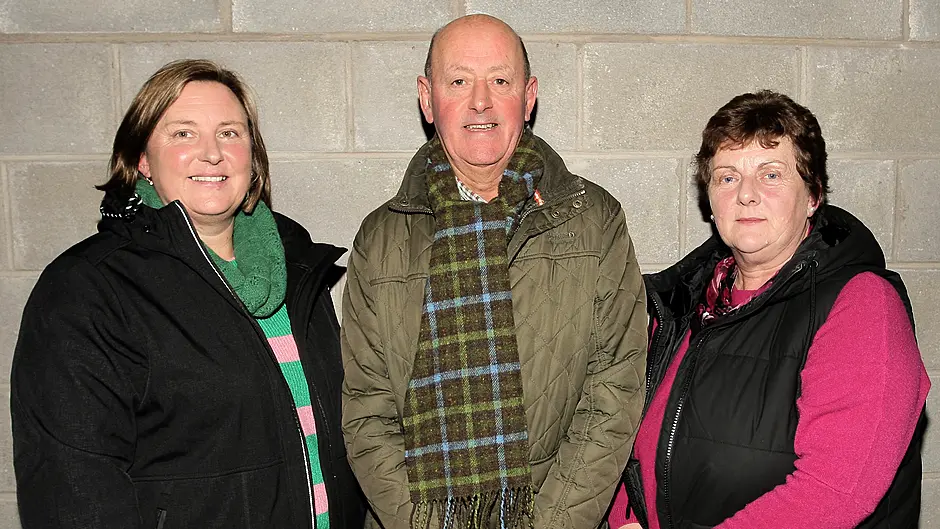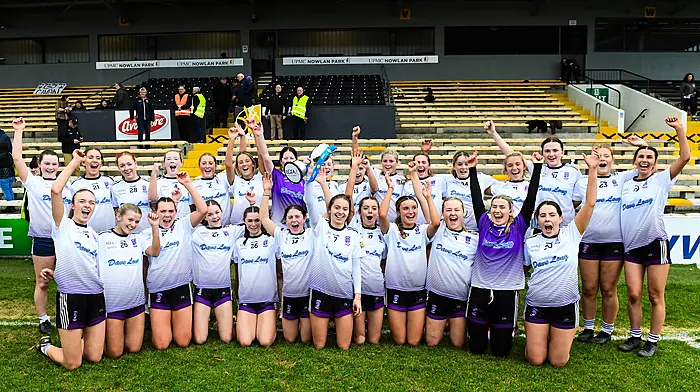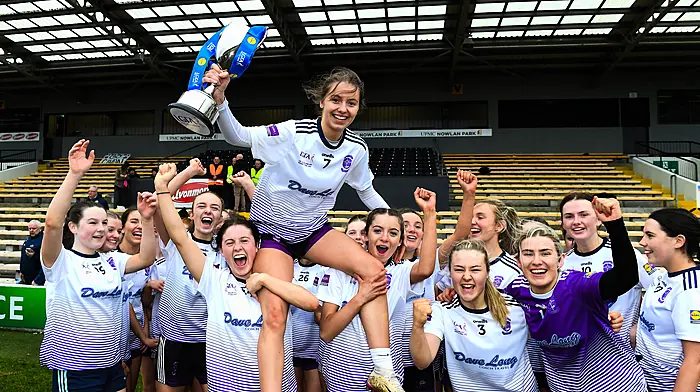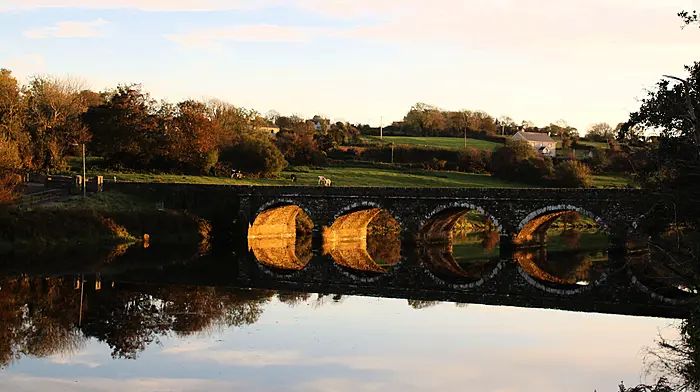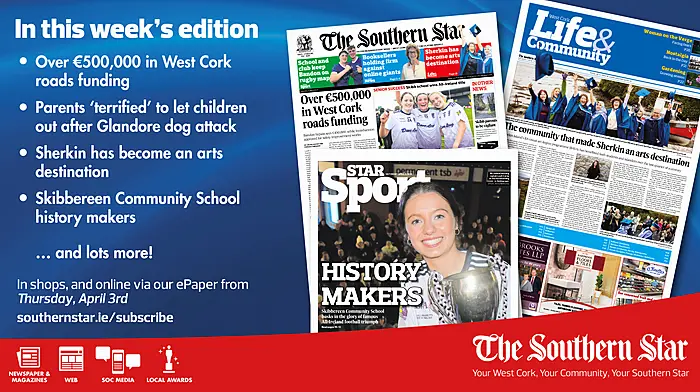THE playing of U21 championships in the depths of the winter was one of the topical issues debated at the recent Carbery convention in the Tadhg MacCárthaigh GAA hall.
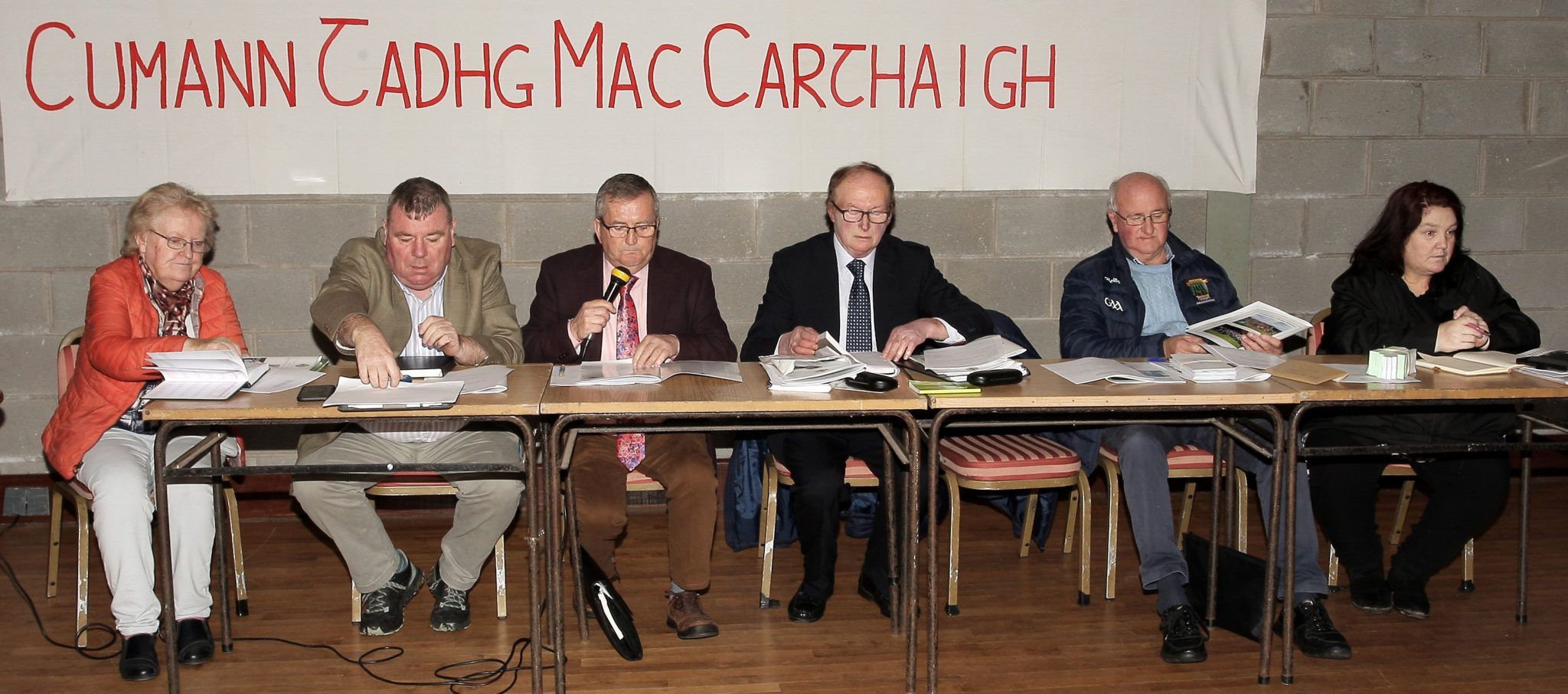 Pictured at the top table at the Carbery convention on Friday night in Aughaville were, from left, Gabrielle Crowley (Randal Óg), cultural officer; David Whyte (St Mary's), vice-chairman; Aidan O'Rourke (Newcestown), chairman; Don Desmond (Bandon), secretary; Pat Joe Connolly (Bantry Blues), treasurer, and Martina Burns (Clann na nGael), assistant secretary.
Pictured at the top table at the Carbery convention on Friday night in Aughaville were, from left, Gabrielle Crowley (Randal Óg), cultural officer; David Whyte (St Mary's), vice-chairman; Aidan O'Rourke (Newcestown), chairman; Don Desmond (Bandon), secretary; Pat Joe Connolly (Bantry Blues), treasurer, and Martina Burns (Clann na nGael), assistant secretary.(Photos: Paddy Feen)
While matters on the playing pitches brought great satisfaction, a number of items did cause problems during a long season. Among these were lack of referees, the state of pitches late in the year due to terrible weather conditions, online ticketing by the county board, Cork games being put behind a paywall, difficulties in paying club insurance on the new online format, the U21 championships, second teams of senior and intermediate clubs, and the lack of a 4G pitch in the division to counteract the bad weather. All these items received an airing from the delegates during the meeting.
While there was little debate on the secretary’s comprehensive report, a discussion did take place on the U21 championships with Pat O’Flynn of Ballinascarthy asking for the U21 to be restored to the beginning of the season, in March, as it provided a great opportunity for adult mentors to see what young talent was available for the year.
 Dohenys delegates, Ray O'Mahony, Mark Farr and Barry Collins, at the convention.
Dohenys delegates, Ray O'Mahony, Mark Farr and Barry Collins, at the convention.
The competition was discontinued at county level but the Carbery board ran their U21 championships this season in October and November, the only window available. However, bad weather and unplayable pitches meant that the U21A championship still isn’t finished and two of the games had to be played on Bishopstown’s 4G pitch. It was pointed out that the county board would not allow the championship to be played in March as the Cork U21 players would not be available to the clubs.
Noel O’Callaghan, the new incoming vice-chairperson of the county board, explained that for 2024, a window of three weeks in February would be allowed to divisions to play a knock-out U21 competition. Championship administrator Tom Lyons stated that the window was totally inadequate because, on top of bad weather and unplayable pitches in February, getting players to train in January for a possible single game in February was a non-runner and would do nothing to develop young players and hold their interest. The expense of affiliating a team for a single game meant the clubs would not buy into it.
Meanwhile, John Murphy of Carbery Rangers raised the issue of second teams of senior and intermediate clubs being asked to play championship games at awkward times. On one particular weekend, his club was the only one fixed to play their junior game prior to the senior game, which discriminated against his club. Denis O’Sullivan of Clonakilty pointed out that his club had to play junior on a Sunday evening, after their seniors had played that afternoon. That meant some of the players were togged out from 2pm to 10pm that day, which was totally unacceptable. Tom Lyons pointed out that their junior fixtures, especially for second teams, were governed by county board fixtures and they did their best to be fair to all teams but there had to be give and take from clubs.
The issue of not being able to pay cash at county board games was raised by John O’Driscoll, O’Donovan Rossa, and several other delegates. Again, the elderly were the main victims here and there was general agreement that many neutrals were abandoning games because of the hassle of pre-booking tickets online. Noel O’Callaghan admitted that the attendances at county board games were down during the season, especially for the knock-out stages, but gate income was actually up because of raised prices. The chairperson, Aidan O’Rourke, had raised the issue of providing one cash turnstile for Páirc Uí Chaoimh and Páirc Uí Rinn at county board meetings, but, disappointingly, was not supported by other divisions.
 Delegates at the convention; from left, Bobby Evans, O'Donovan Rossa; John Murphy, Carbery Rangers, and Mike O'Rourke, Carbery Rangers.
Delegates at the convention; from left, Bobby Evans, O'Donovan Rossa; John Murphy, Carbery Rangers, and Mike O'Rourke, Carbery Rangers.
Games under the Carbery Board are still all cash but this is causing a problem now with many young people who use only cards instead of cash. It was agreed that the only acceptable practice would be a combination of all three – cash, card and online booking. These unanimous views of the Carbery delegates on paywall and ticketing are to be conveyed to the county board executive.
Strangely, there were no questions on Padjoe Connolly’s treasurer’s report. The board showed a profit on the year’s activities with income from gates well up on 2022. Main items of expenditure were referees’ expenses, coaching, Carbery teams, medals and trophies. PRO Martina Burns, was presenting her last report to convention as she has now taken up the new position of assistant secretary. Nomination forms for PRO have been sent to the clubs.
Vice-chairperson David Whyte gave a rundown on the Carbery divisional teams in 2023, including the search for new football and hurling managers. While there is good progress on securing a manager for the football team, the same cannot be said of the hurling and all hurling clubs were asked to help. Without a management team, it will not be possible to field a Carbery hurling team in 2024, depriving a lot of good young hurlers in the division of playing senior championship hurling.
***
The 2024 officer board shows one change from last season, with Martina Burns, the outgoing PRO, taking up the new position of assistant secretary. The PRO position is now vacant. Chairperson Aidan O’Rourke pointed out that under the new county board regulations, the positions of development officer and coaching officer were now disbanded at divisional level. A new term of five years, instead of three, for all officers is now in force, but O’Rourke pointed out that as he came in under the three-year rule in 2022, he would not be availing of the new five-year term and this would be his final year as chairperson.
The Carbery board for 2023 is as follows: president, Séamus Coakley (Diarmuid Ó Mathúna); chairperson, Aidan O’Rourke (Newcestown); vice-chairperson, David Whyte (St Mary’s); secretary, Don Desmond (Bandon); assistant secretary, Martina Burns (Clann na nGael); treasurer, Padjoe Connolly (Bantry Blues); cultural officer, Gabrielle Crowley (Randal Óg); PRO – vacant); county board delegates – Danny Warren (St Mary’s) and Aidan O’Rourke (Newcestown).

